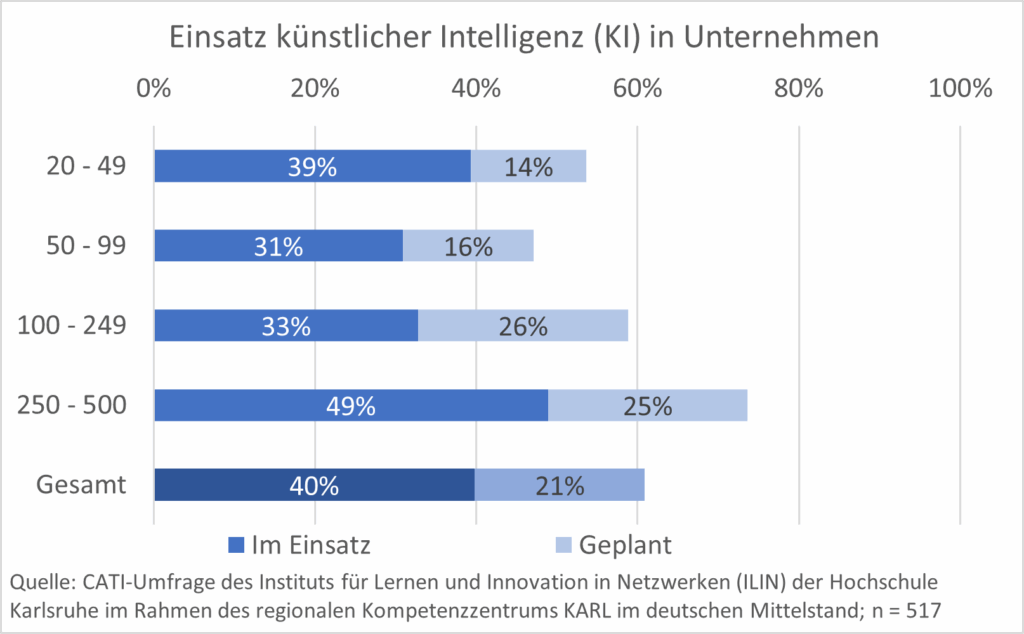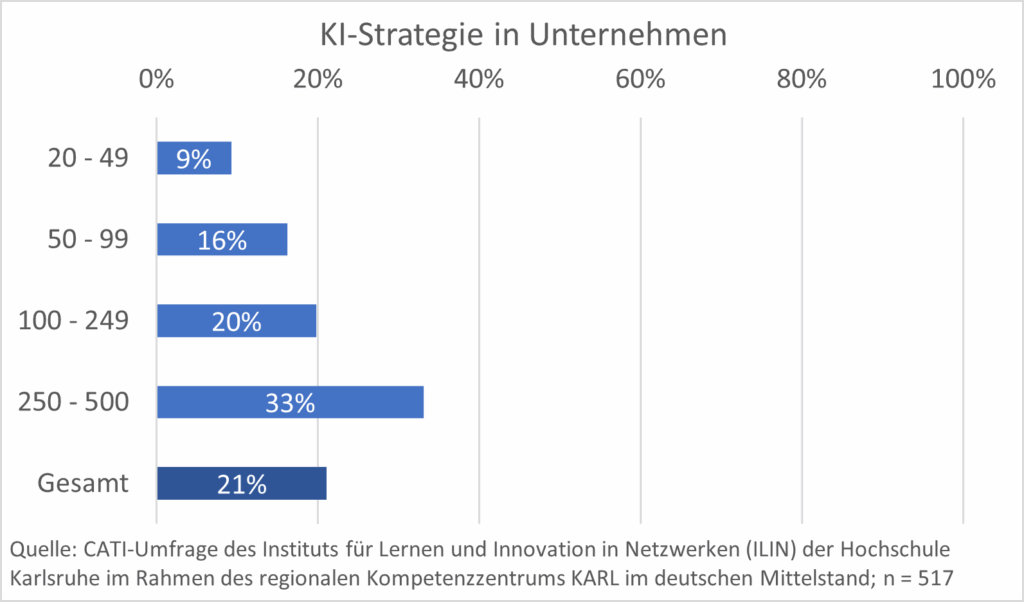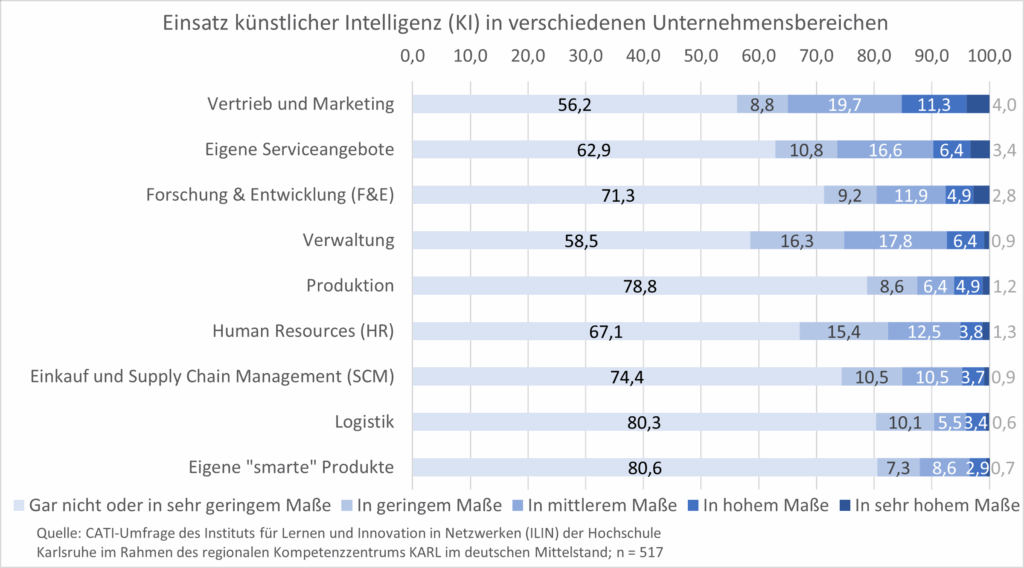Use of AI in German SMEs – dynamic, but often without a strategy
Survey in the Competence Center KARL - Artificial Intelligence for Work and Learning in the Karlsruhe Region
The Institute for Learning and Innovation in Networks (ILIN) at Karlsruhe University of Applied Sciences (HKA) has conducted a current survey on the use of AI in German SMEs as part of the regional Competence Center KARL – Artificial Intelligence for Work and Learning in the Karlsruhe Region. From mid-March to mid-May 2025, decision-makers involved in technology and AI implementations from a total of 517 commercial enterprises with 20 to 500 employees participated in a computer-assisted telephone survey. Twenty-seven percent of the companies surveyed are small businesses with 20 to 49 employees, 39% have 50 to 249 employees, and 34% are larger SMEs with 250 to 500 employees. The industries surveyed include both manufacturing and knowledge-intensive services. The study thus provides an excellent cross-section of medium-sized industry in Germany.
Positive and dynamic picture for use of AI in German SMEs
As it turns out, 40% of the companies surveyed currently use Artificial Intelligence (AI) in their business, and 21% plan to use it in the near future (Fig. 1). These figures essentially correspond to the latest statistics from the ifo Institute on the use of AI in the German economy (ifo Schnelldienst digital 8/2025: Mehr KI, weniger Jobs? Was Unternehmen in Deutschland erwarten) and confirm the high quality of the database. According to this, more than 60% of German SMEs are expected to use AI applications in the near future, which can be interpreted as a positive sign for the current and future expansion of this groundbreaking technology. As expected, there are differences in AI use depending on company size. Larger SMEs with 250-500 employees are currently the most likely (49%) to already be using AI, with a further 25% planning to use it in the near future. This means that three-quarters of this core sector of German industry is likely to be using AI in its business processes soon. The second-highest user rate is among the smallest companies with 20-49 employees, at 39%. Small companies, in particular, are also actively using AI applications, which may be due to the greater freedom and less regulated processes within this group of companies. Around one-third of companies with 50-249 employees use AI technologies. Overall, the picture of AI use in German SMEs is encouragingly positive and dynamic for the near future.

Only 21% of the SMEs surveyed have an AI strategy
A closer look at the intensity and areas of business in which AI is used reveals a differentiated picture (Fig. 2). At 15%, AI is currently used most frequently in sales and marketing, to a high or very high degree. On the one hand, this confirms the high potential for customer data analysis, forecasting, and segmentation; on the other hand, the 15% share of companies with intensive use in this field is also sobering. The companies surveyed follow at a considerable distance in terms of (very) high AI use with their own service offerings (10%), research and development (8%), administration (7%), and production (6%). The controversial use of AI in human resources (HR) has so far only been implemented to a (very) high degree in 5% of cases. Less than 4% say they use AI to a (very) high degree for their own innovative products. “When developing their own products with smart functions, companies currently seem to be struggling to identify attractive use cases that promise better customer benefits and are also rewarded accordingly by customers,” says Prof. Dr. Steffen Kinkel from the Faculty of Computer Science and Business Information Systems and head of ILIN. “Companies find it easier to use AI in their own service offerings. This technology could therefore also drive the further service orientation (servitization) of German industry, which has been very product-oriented up to now.”
However, most of the companies surveyed seem to take a less strategic approach to the planning and introduction of AI applications. Only 21% of the companies surveyed report having an AI strategy in place (Fig. 3). Almost two-thirds (64%) of companies that already use AI and 83% of companies planning to use AI in the near future do not have an AI strategy. As expected, there are differences depending on company size. Among large and medium-sized companies with 250-500 employees, one-third already have an AI strategy, compared to only 9% of the smallest companies with 20-49 employees. “On a positive note, many companies are already experimenting with AI applications and gaining important experience,” says Steffen Kinkel. The critical issue remains the lack of a strategic view of future application fields, which is an essential basis for the broader and effective use of AI applications after the trial phase.


Three-quarters of all respondents may use Large Language Models
The use of generative AI in business is currently a hot topic of debate, with huge language models (LLMs), i.e., AI models that serve to interpret and generate human language, such as ChatGPT or Aleph Alpha. Currently, employees in three-quarters of the companies surveyed (73%) are permitted to use large language models (Fig. 4). In almost half of the companies surveyed (48%), their use is unrestricted, and freely available language models can be utilized. In about a quarter of companies (23%), however, only language models provided by the company – and thus designed in accordance with its guidelines and (data) regulations – may be used. The use of large language models is most frequently regulated in larger medium-sized companies with 250-500 employees. In 35% of cases, only language models provided by the company may be used. Here, the controllability and traceability of language models are given significantly greater importance than in smaller companies, where the restriction to proprietary language models applies in only 16 to 19% of companies. The unrestricted use of freely available language models is currently most prevalent in medium-sized companies with 100-249 employees, where 58% of these companies practice this approach. This is where the most significant risk lies: users of language models unwittingly and uncontrollably make sensitive data and information available. “The use of generative AI requires special skills, such as the ability to evaluate AI-generated content and recognize potentially erroneous information critically,” emphasizes Steffen Kinkel. “This points to an urgent need for awareness-raising, training, and design in relation to the introduction and use of generative AI in German SMEs.”

Comprehensive range of services offered by the Competence Center KARL
The Competence Center KARL has developed a comprehensive range of support services for the successful introduction of artificial intelligence (AI) in companies. This includes, for example, assistance in identifying and selecting a suitable AI use case for individual companies (AI selection aid), assessing the technical and organizational AI readiness of the company (AI readiness check), and identifying and analyzing the skills necessary for a successful AI implementation (AI skills benchmark).
For more information, visit kompetenzzentrum-karl.de/karl-angebote
About Competence Center KARL
The results presented were produced by the regional Competence Center KARL (funding code: 02L19C250), which is funded by the Federal Ministry of Research, Technology and Space (BMFTR) as part of the program “Zukunft der Wertschöpfung – Forschung zu Produktion, Dienstleistung und Arbeit (The Future of Value Creation—Research on Production, Services, and Work)” and supervised by the PTKA Karlsruhe. The survey covers other aspects of AI introduction and use, such as prerequisites, human-centeredness, transparency of, and trust in AI. The goal of the competence center KARL is to systematically design human-centered, transparent, and learning-friendly AI-supported work and learning systems and demonstrate them in concrete practical applications. The tools, methods, and best practices developed in KARL are intended to enable companies to implement attractive AI-supported working environments. The focus is on hybrid systems that combine the advantages of human intelligence and Artificial Intelligence. In addition to the overall coordination of the design areas, the FZI is specifically concerned with the process-oriented introduction of AI into work processes and the ethical, legal, and social design of AI-supported work systems.
Project partners alongside the FZI:
Karlsruhe University of Applied Sciences (HKA), Fraunhofer Institute of Optronics, System Technologies and Image Exploitation IOSB, Fraunhofer Institute for Systems and Innovation Research ISI, Karlsruhe Institute of Technology (KIT), Forum for Social Technology Design, CyberForum e.V., adesso SE, ArtiMinds Robotics GmbH, Blanc & Fischer Familienholding GmbH, Datalyxt GmbH, EDI GmbH, init innovation in traffic systems SE, Kinemic GmbH, LAVRIO.solutions GmbH, Optimum datamanagement solutions GmbH, SICK
